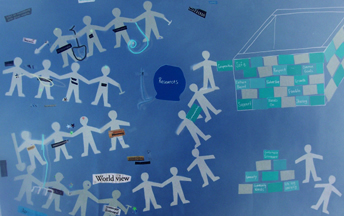Although this project was not mainly about policy change,
we gained some insights from our research that may have some useful
public policy implications. The following recommendations are based
on what we learned by studying a diverse selection of learning circles,
by listening to some learning circle participants who were brought
together for the Widening the Circle Symposium and by engaging in discussions
with the project’s
Working Group. In order to think about the project’s recommendations
we posed two questions about learning circles:
- Do learning circles contribute to the public good?
- How can learning circles be supported?
By answering these questions, we hope to contribute to our understanding
of learning circles in Canada in a way that informs decision-making by
policy makers, researchers and community groups.
But before going on to answer these questions we should
revisit what we in this project meant by learning circles. This is
important, in
order to keep our recommendations focused on the kinds of the learning
circles we wanted to address, and not some other unrelated ones. Any
Google search on “learning circles” will reveal the vast
array of groups and activities that people call learning circles,
from management sales training to virtual networking of professionals
to monthly membership meetings. As we stated above, the learning
circles we looked at have some specific features that set then apart
from these other groups: an emphasis on face-to-face on a regular
basis, peer learning and a focus on specific actions. These are described
elsewhere in this report. These characteristics also differentiate
the learning circles of this project from support groups which, while they are often beneficial to
people in dealing with important situations and issues in their lives,
are not primarily about learning.
In making recommendations relating to public policy, the first question
we need to pose is: Do learning circles contribute to the public good?
By listening to learning circle participants, organizers and facilitators,
we got a clear sense that learning circles do serve the public good in
a number of ways. These can be roughly sorted into three categories,
that is, learning circles contribute to the public good:
- as effective and inclusive learning opportunities,
- as a means of increasing social capital, in ways other than adult
learning opportunities,
- as a way of increasing the effectiveness of other programs by bringing
in the dimension of learning into their work.
These categories should not be taken to imply that
adult education does not also in itself contribute to social capital.
Far from it; in fact there is an extensive literature linking social
capital and adult learning (1). We are only making a distinction between
those contributions
to social capital that relate specifically to adult learning and
those that are more general.
Effective and inclusive learning opportunities. Learning
circles contribute to the public good by providing inclusive settings
for adult learning opportunities, as we have seen on the section on learning
and inclusion. Learning circles do this because they:
- create supportive and accessible learning settings,
- provide opportunities for adults to learn skills, such as literacy
skills, in contexts that are meaningful to them,
- help participants to understand who they are, where they are going
and how to get there,
- support and encourage peer learning,
- support the creation of place-based learning communities (2).
A means of increasing social capital. We also
heard that learning circles contribute to the public good by increasing
social capital. This concept has been defined in various ways and has
been the focus of intense debate in recent years. For the purposes of
this project, we need not concern ourselves with this debate or the literature
it has generated. Whatever the ultimate conclusion of these debates,
social capital is a useful reference point for discussing the value of
learning circles in Canada. It is enough to point out that most definition
make an explicit link between group learning and social capital. For
example, Maskell (2000) put it this way:
Social capital refers to the values and beliefs that
citizens share in their everyday dealings and which give meaning and
provide design for all sorts of rules. The word “capital” implies that we
are dealing an asset. The word “asset” tells us that
it is attained through membership in the community. Social capital
is accumulated within the community through processes of interaction
and learning (3).
As noted above, the link between adult learning and social capital is
well established. The link between non-formal learning and social capital
has also been well documented (4). The question here is how in particular
learning circles increase social capital, beyond what other kinds of
adult education contribute.
Some of the ways that learning circles support and increase social capital
are by:
- breaking down barriers within and among communities,
- synthesizing different kinds of knowledge, e.g. local ecological
knowledge and scientific knowledge,
- increasing understanding and tolerance of cultural differences,
- creating networks for personal support,
- setting community goals,
- supporting community development,
- supporting cultural reclamation,
- providing opportunities for literacy learning.
A way of increasing the effectiveness of other programs
by bringing the dimension of learning into their work. Learning
circles contribute to the public good by enabling other non-educational
community organizations to be more effective in reaching their goals
by building learning into their programming. There were number of
examples of this in the narratives, and this point was brought up
several times in discussion at the Widening the Circle Symposium.
How to support learning circles. If
we are right in concluding that learning circles have some role in
contributing to the public good, what role should government take in
order to support them. This is a good point to stop and pose the question:
Does government need to do anything at all about learning circles? After
all, these circles seem to be happening anyway, and seem to be making
a difference.
When looking at the extent of non-formal adult learning as a whole the
OECD came to a similar question in its study of adult learning in Canada.
The question is what to make of the extensive amount of informal learning.
Perhaps we should all simply leave this issue alone, for fear that recognizing
informal learning, organizing it and rewarding it will simply turn everything
into a variant of formal learning- bureaucratization of everything (5).
At the other end of the spectrum there is a temptation to say that ,
if learning circles are really that valuable to the public good, then
government should get to work on designing and implementing policies
and programs that will make them more effective and accountable. Canada
has a long history of the state playing this kind of role in supporting
activities beneficial to the public good. For example, the Participaction program
in the 1970’s supported exercise as a means of improving population
health.
Between the extremes of saying that there should be
an absolute role for either the state or civil society, participants
at the Widening the Circle Symposium found a middle ground. They said
that, yes, there
are some ways that governments could support, strengthen and increase
learning circles, but it probably does not need a special policy
initiative, or new grant program, or bureaucratic agency. The fear
was that this kind of approach might do more to weaken learning circles
than to strengthen them. The nature of learning circles is fundamentally
that they are part of civil society. That is they are formed by groups
of people and community organizations without a specific state incentive
or direction. This may one of the reasons they are so effective and
abundant.
Having said that there may be some very practical and useful things
that government could do to support the development and strengthening
of learning circles, as follows.
- Promote public awareness of the value of learning circles.
- Provide support for workshops on learning circles conducted by
learning circle participants for interested people and organizations
in their communities.
- Provide support for workshops designed for people already involved
in learning circles so that expertise can be shared and developed.
- Provide support for networking by learning circle participants
on a national level.
- Make public space available to learning circles.
- Make funding available to learning circles for start-up, childcare,
transportation and supplies.
- Make funding available to learning circles for facilitation.
- Make funding available for support on literacy issues, such as
professional development on learning without relying on written language,
using accessible written language, explicit and implicit literacy
learning. In some communities, there are community literacy programs
that could be funded to provide these kinds of support.
- Provide funding to existing networks that are supporting learning
circles, such as the Women’s Institutes.
The key point here is that are ways in which government could support
learning circles. Undoubtedly, much of the support could be provided
through existing programs, with in existing policy frameworks. This should
not be taken as an invitation for government to do nothing. On the contrary,
we believe there are important opportunities here for the federal and
provincial governments to support individuals and communities.
Balatti, J., and I. Falk (2001). Socioeconomic Contributions of Adult
Learning to Community: A Social Capital Perspective. Launceston: University
of Tasmania. Available at http://www.crlra.utas.edu.au/files/discussion/2001/D10-2001.pdf
Faris, R. (2004). “Lifelong Learning, Social Capital and Place
Management in Learning Communities and Regions: A Rubic’s Cube
or a Kaleidoscope?” Observatory PASCAL. Available at http://www.obs-pascal.com/resources/faris_2004.pdf
Maskell, P. (2000). “Social Capital, Innovation and Competitiveness.” In
Baron, S., J. Field and T. Schuller, eds. Social Capital: Critical
Perspectives. New York, Oxford University Press.
Faris, op. cit.
OECD Thematic Review of Adult Learning, 2002. Available
at http://www.cmec.ca/international/oecd/adult.note.pdf















 National
Literacy Secretariat
National
Literacy Secretariat 

 NALD
NALD